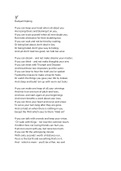If
Rudyard Kipling
If you can keep your head when all about you
Are losing theirs and blaming it on you,
If you can trust yourself when all men doubt you,
But make allowance for their doubting too;
If you can wait and not be tired by waiting,
Or being lied about, don't deal in lies,
Or being hated, don't give way to hating,
And yet don't look too good, nor talk too wise:
If you can dream - and not make dreams your master;
If you can think - and not make thoughts your aim;
If you can meet with Triumph and Disaster
And treat those two impostors just the same;
If you can bear to hear the truth you've spoken
Twisted by knaves to make a trap for fools,
Or watch the things you gave your life to, broken,
And stoop and build 'em up with worn-out tools:
If you can make one heap of all your winnings
And risk it on one turn of pitch-and-toss,
And lose, and start again at your beginnings
And never breathe a word about your loss;
If you can force your heart and nerve and sinew
To serve your turn long after they are gone,
And so hold on when there is nothing in you
Except the Will which says to them: 'Hold on!'
If you can talk with crowds and keep your virtue,
' Or walk with Kings - nor lose the common touch,
if neither foes nor loving friends can hurt you,
If all men count with you, but none too much;
If you can fill the unforgiving minute
With sixty seconds' worth of distance run,
Yours is the Earth and everything that's in it,
And - which is more - you'll be a Man, my son!
, VOCABULARY
Make allowance - ‘to make allowance’ for something means to accept it even if it’s
flawed or problematic.
Doubt - The feeling of not trusting yourself or someone / something else.
Impostor - A fake person who pretends to be someone they’re not.
Knaves - Dishonest or sneaky people.
The Will - A reference to ‘willpower’, the motivational force in a human’s psychology
- the idea of ‘the Will’ is important in philosophy and religion, many people debate
over whether we have ‘free will’ (complete freedom of choice in our actions in life) or
whether our lives are deterministic (already set out for us, either by religious or social
mechanisms).
Virtue - Purity and goodness.
STORY/SUMMARY
This is a lyric poem, so there’s not exactly a story to it - instead, it’s an exploration of
an idea. In this case the speaker is addressing the reader, giving us some wise advice.
This advice takes the form of how to be, but also what to avoid in life - and to not copy
the bad behaviour of others.
In Stanza 1 Kipling says to stay strong and clear-headed even if others are hostile
towards us, to trust ourselves even when others don’t (but also to accept that they
might doubt us), to encourage patience, to not lie even if people lie about us, to not
hate others even if we are hated ourselves, and finally to not boast or seem too perfect
and clever about all of our strengths - we shouldn’t ‘look too good, nor talk too wise’.
Stanza 2 gives advice on our thoughts and actions: we should think and dream, but not
allow these to control us, and we should not be too influenced by moments of extreme
success (Triumph) or failure (Disaster). We should also be able to withstand seeing our
truths manipulated by others, and our hard work coming undone or being broken.
When something we’ve put effort into has broken, we should work to fix it again.





